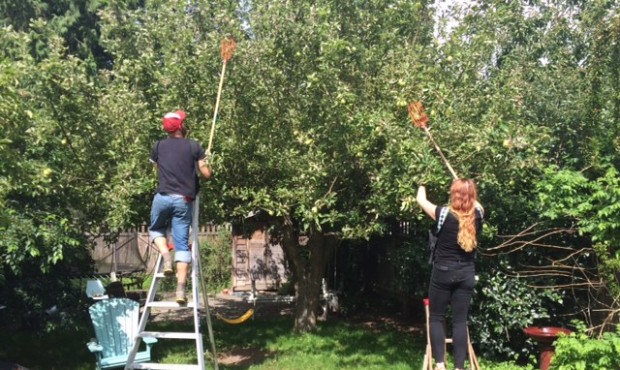City Fruit harvests sagging fruit trees, donates to local food banks
Jul 6, 2016, 7:14 AM | Updated: 11:33 am

City Fruit harvest manager, Luke Jesperson, picks apples with a volunteer. (Photo by Rachel Belle)
(Photo by Rachel Belle)
Luke Jesperson stands on a ladder in a backyard in Seattle’s Greenwood neighborhood, using a picking tool to pluck green apples from a tall tree. But it’s not his tree or his backyard. Jesperson is the harvest manager for City Fruit, a Seattle nonprofit that will come to your house, harvest your fruit and donate it to local food banks.
“The tree we’re at right now, you can have a couple hundred pounds of fruit that ripens and over-ripens in a matter of a couple days. No single tree owner, in general, can handle all that fruit,” Jesperson says. “So people will harvest whatever they can use themselves or whatever their neighbors want. We’ll pick whatever’s left and donate it to food banks. We get it to people who otherwise wouldn’t get healthy, fresh produce, potentially.”
Michael Wells is the owner of the home and the apple tree being harvested. He says before his wife discovered City Fruit, most of their apples ended up in the compost bin.
“We’d eat a few,” he says. “The bigger of the two trees produces apples that I think are better for baking, not apples you want to take off the tree and bite into. Mostly they just went into the yard waste, to be honest.”
Last year, City Fruit visited just over 500 homes and picked more than 36,000 pounds of fruit. All of that fruit ended up at food banks, instead of in the compost bin or rotting all over yards and sidewalks.
“Think about every fallen plum or every fallen apple being a potential fresh, healthy snack for somebody in the community,” says Jesperson. “Whenever I go to a tree, the first thing we look at is an estimated total poundage. But then that’s easily translated into, wow, this is going to be enough to donate to 100 families or 200 families. Putting a personal touch on thinking about all the waste is the way my mind works when I see trees with fruit on them throughout the city that are just falling and going to waste.”
They even have a plan for your bruised and ugly fruit.
“Some of this can’t be donated to the food banks. You know, there’s pest damage. Anything that can’t be donated for people to eat, we try to find people to press it into cider or get that food to animals. A lot of tree owners, especially apple owners, will call us and be like, ‘Oh, we have a lot of fruit but you won’t want to pick it because it looks terrible.’ But we try to get out the message that there’s some sort of productive use for any fruit, whether it be for human consumption or animal consumption or turning it into a tasty cider.”
This year they partnered with Seattle Cider C., which made a hard cider using 100 percent City Fruit harvested apples and donated half of the profits back to City Fruit.
And since trees only bear fruit about half the year in Seattle, City Fruit fills the rest of the year with education.
“We’ve partnered with Whole Foods this year, we’re doing waste reduction classes. Teaching people, not just how to use their fruit but, other ways in which they might see food waste. Teaching people how to make sauces with things at the bottom of their bottles. Because we also realize that about 40% of food produced in this country, and worldwide, goes to waste. That’s totally unacceptable.”
Click here for more information on having City Fruit come to your house and harvest your fruit trees for free. They’re also always looking for volunteers.













